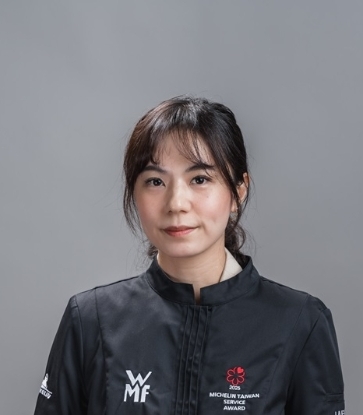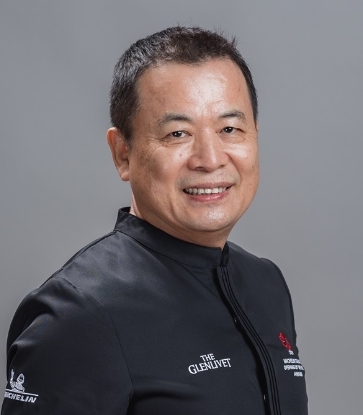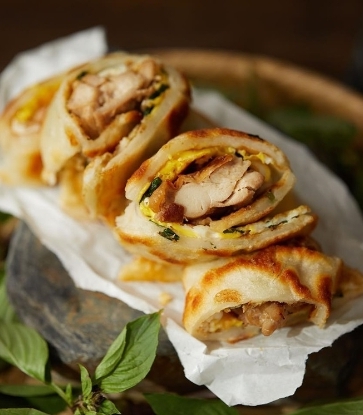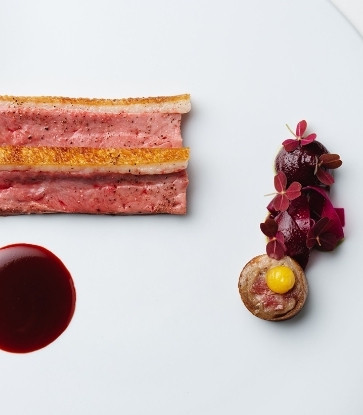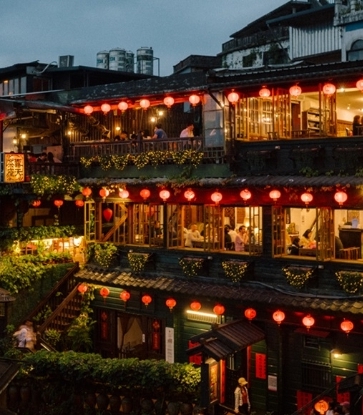Taichung's huist chef, Tim Chen, recalls the moment his name was announced as the recipient of the Young Chef Award at the MICHELIN Guide Taiwan 2024 Ceremony —"When I heard my name, I felt incredibly emotional, but it also seemed so unreal that I didn’t know how to react." With a bashful smile, Tim Chen looked more like an excited boy than a restaurateur, business partner to his wife, and father of three. At 37, his naturally youthful appearance and childlike innocence shone through his smile.
Having spent almost 15 years honing his skills both in Taiwan and abroad, he eventually returned to his hometown of Taichung to establish huist. Winning the MICHELIN Guide’s Young Chef Award now serves as proof that every meticulous step he took was worthwhile, nourishing his culinary journey.

Sophia Huang, Chief Marketing Officer of Mia C’bon, mentioned while presenting the award, "As a premium supermarket brand, Mia C’bon is still relatively young, but we are constantly creating unique consumer experiences. We hope that every customer can enjoy life conveniently while contributing to positive change in the world." Similarly, the Young Chef Award recipients and chefs showcase their unique personalities and potential, constantly pushing boundaries to demonstrate the endless possibilities of each ingredient, creating beautiful encounters between customers and cuisine.
RELATED: A MICHELIN Inspector's Love Letter to Taiwan: 5 Delightful Discoveries I've Encountered

Home-cooked Style Taiwanese Flavours: Heartwarming Dishes with a Touch of Romanticized Ritual
In Dutch, "huist" means "house." Tim Chen’s Huist is centred around home-style Taiwanese flavours, aiming to tell a story about "home."
For the first menu, Chen took inspiration from "meat jelly," often found on his family’s dinner table with white cut chicken. (Left: Free Range Chicken/ Pickled Vegetables. ©huist)
He reimagined the gelatinous texture of the chicken using French techniques, preparing the free-range chicken through confit, a clarified consommé, and serving it with sorrel, shallot oil, spring onion-infused oil, and Dijon mustard. Diners use both chopsticks and cutlery, showcasing a fusion of Eastern and Western dining styles.

For his summer menu, Chen deconstructed and reimagined Taichung’s local summertime staple, Moroheiya soup, a dish his grandmother frequently made. This then became the dish "Langostinos /Sweet Potato," preserving the original flavour of Moroheiya while balancing its bitterness with a flavourful broth made from kombu and dried clove fish. The Argentine Red Shrimp is prepared using an overnight dry method to achieve a tender texture and enhance the natural sweetness of the sea. Taiwanese signature No. 57 sweet potatoes are served as soft, chewy gnocchi-like dumplings. The dish is simply seasoned with lemon olive oil and sea salt, with a bitter, sour, and refreshing aftertaste—a perfect compliment for a scorching summer.
RELATED: The Best MICHELIN-Recommended Restaurants in Taichung Perfect For Celebrations

Even the desserts evoke sweet memories of Taiwan. The "White Gourd/Balvenie Double Wood 12 Year Old" dessert features winter melon slices with a bergamot aroma, paired with granny smith apple and winter melon mousse, ginger candies, and whisky-vanilla ice cream, offering a rich, sweet flavour with deep whisky notes.

Memories of Home: Fueling Culinary Passion
The concept of huist is rooted in Chen’s warm memories of growing up in a large family and the tastes of his grandmother’s cooking. It also stems from his reflections on the post-pandemic dining market, where he boldly sought to offer something different.Chen grew up in a household with three generations under the same roof, which shaped his passion for food. "During holidays, the family adults would make Zongzi (rice dumplings) or pastries as gifts, I would help knead the dough, stuff ingredients, or stir fillings. These memories deeply connected me to the idea of 'eating' and the warmth of home." After graduating from a culinary management programme in 2009, he secured an opportunity at now-defunct Le Moût, a French restaurant considered the pinnacle of fine dining in Taiwan at the time. There, he learned to meticulously pursue perfection and master the art of sauces and broths, which laid the foundation for his culinary skills.
Two years later, Chen joined Singaporean chef Justin Quek at Just In Bistro in Taipei. The restaurant’s fusion of French techniques and Asian flavours was a revelation for him, inspiring him to develop his "chef’s mindset". This experience ignited his curiosity about combining French culinary methods with Taiwanese flavours, which eventually influenced huist’s menu. "I was blown away the first time I tried the laksa pasta—I never thought cooking could be done in such a creative and bold way," he said.
RELATED: Table for One: The Best Places for Solo Dining in Singapore

Clear Goals: Gradually Mastering Culinary Skills
He travelled to Australia two years later, where he refined different aspects of his skills in various restaurants. At Sydney Opera House’s Opera Bar, he learnt how to handle a constant influx of customers, requiring extreme precision and speed in the kitchen. At Albert St. Food & Wine in Melbourne, he worked with Australian native ingredients, adopting a "whole food" and zero-waste approach, which taught him how to fully utilise every part of ingredients. He later joined RAW, a now two-MICHELIN-starred restaurant where he prepared seafood and meats for the kitchen. Due to RAW's high customer volume, his ingredient handling had to be fast and precise, with no room for error. He also had the opportunity to work alongside world-class chefs visiting for guest chef events, honing his ability to maintain near-perfect standards.
"Everything I learnt came together at RAW, where the high-pressure environment helped me improve rapidly." Chen recalls. The emphasis on exploring Taiwanese flavours at RAW became the key source of inspiration for huist’s focus on home-style Taiwanese cuisine.
In 2017, Chen and his wife returned to Taichung to open Hue Coffee, inspired by their favourite coffee shops in Australia. However, the pandemic caused significant losses, leaving him extremely stressed that he lost his sleep. As the pandemic subsided, Chen noticed a shift in the dining market. With fewer foreign tourists, lower average spending, and limited dining preference centred around hotpot and barbecue, he decided to pivot back to fine dining and offer something different in Taichung.
RELATED: The Evolving Flavor of Taiwan’s Cuisine Through the Eyes of 4 MICHELIN-Starred Restaurant Chefs

"Chef Marcus and I want to provide a simple yet ceremonial dining experience. Throughout the transition, I’ve realised that Taiwan is an inseparable part of my identity. Growing up here, it’s important for me to share Taiwanese flavours through my own interpretation, which brings a sense of excitement and fulfillment." says Chen.
RELATED: Eat Taiwanese Across The World

Amid staff shortages and rapid market changes in the post-pandemic era, Chen sees the value of the restaurant industry clearer than ever and encourages young aspiring people to join the industry. "This industry won’t disappear or be replaced by AI. In fact, as living standards improve, the role of chefs will evolve from merely fulfilling basic needs to enhancing sensory experiences," he explains.
Chen advises young chefs to broadly gain experience, set clear goals, and find partners who share the same growth mindset. He emphasises the importance of staying objective when facing challenges and continually investing in skills to achieve long-term success.
"The growth you gain for investing in your experience and skills is exponential." Chen says, offering wisdom from his own journey.
Further Reading: Inspectors Reveal All on MINIMAL, the First Ice Cream Establishment Globally to be Awarded a MICHELIN Star






